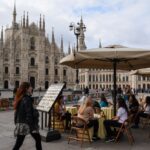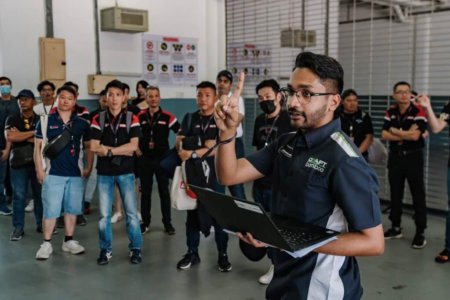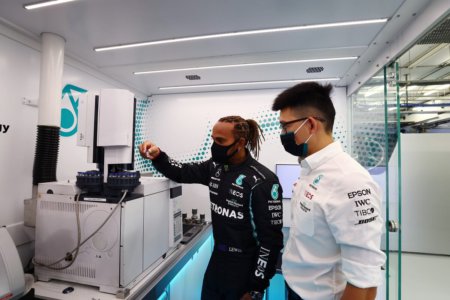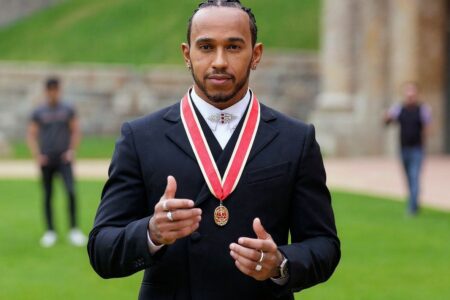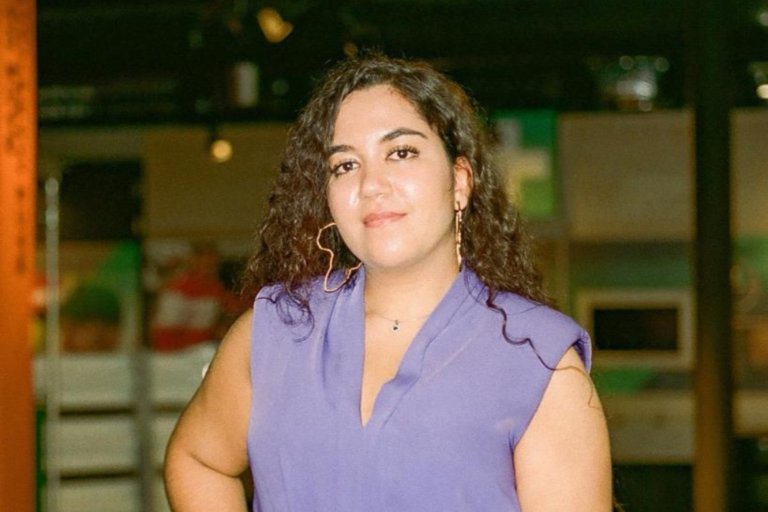
It’s no secret that Formula One (F1) has a poor track record with diversity.
In 2020, Sir Lewis Hamilton partnered with the Royal Academy of Engineering to form the Hamilton Commission. A year later, it revealed the findings of its research into the underrepresentation of Black people in UK motorsport, which include:
- Black and other minority ethnic backgrounds, as well as women in motorsport (including female engineers), had to endure banter that crossed the line and which they found offensive.
- 83% of people from Black, Asian and minority ethnic groups had experienced racism within the sport.
- There have only been two female and no Black Team Principals in the history of F1.
While many fans may know Hamilton for being a seven-time world champion, not many may know of his work off the track.
Take Mission 44, for example.
Launched in the aftermath of the Black Lives Matter protests, the British racing driver invested 20 million pounds to kickstart the charity, which aims to transform the lives of young people from underrepresented communities.
“I know not every young person has the same opportunities as me,” Hamilton shares.
“That’s why, despite the championships, the wins and the pole positions, setting up Mission 44 has been my proudest achievement so far.”
Most recently, Mission 44 partnered with the Royal Academy of Engineering — backed by support from the Mercedes-AMG PETRONAS F1 Team — to develop the MSc Motorsport Scholarship Programme.
Five students will receive a grant of 25,000 pounds to cover full tuition fees and living costs, along with wraparound support through networking events and motorsport experiences.
Within two years of completing the MSc (short for Master of Sciences), most, if not all, scholarship recipients will be employed in the motorsport sector.
It was a “life-changing opportunity” for Laila Fadli Dokkali. Then, an F1 fan from Spain, Dokkali took the scholarship as her chance to land her dream career to join the elite racing industry.

Spain is home to the Circuit de Catalunya, a staple in the F1 calendar. Source: AFP
Watching F1 for free on TV
Spain is home to the Circuit de Catalunya, a staple in the F1 calendar. It is also home to two current F1 drivers: Fernando Alonso and Carlos Sainz Jr.
Born in Spain to African immigrant parents, Fadli Dokkali was introduced to the sport by her uncle at a young age.
“Back then, you could watch F1 for free on public TV, so it’s very accessible,” she tells Study International.
“One of the first memories I have with the sport is sitting with my family on Sundays, doing something fun at the moment where we all come together and just watch [the race]. It was a moment I cherished since my parents were always working.”
This was perfect for young Fadli Dokkali since she had an interest in cars, machinery, and trains — all of which fuelled her curiosity throughout childhood.
When she did get to watch the races in person, Dokkali was captivated.
“The cars looked completely different from the ones you would see in the streets,” she says.
“I also couldn’t believe that teams could work together to pull off pitstops in such a short amount of time, especially when you are a child where your conception of time is much shorter. It just blew my mind.”
From then on, she dreamed of making her own F1 cars, being part of the track, and helping teams win races.
Overcoming the stereotypes of being a neurodivergent student
Like many underrepresented communities who aspire to break into the motorsports industry, Fadli Dokkali is painfully aware of the challenges she has to overcome.
And being the neuro-divergent daughter of immigrants, she recalls her teachers not being interested in her or her education.
“Socialising with other students was a struggle,” she adds.
“Since I was from another country, many parents would not allow their children to be near me or play with me. This was also reflected in the student’s behaviour towards me in school.”
According to Harvard Health, neurodiversity is described as the idea that people experience and interact with the world around them in many different ways; there is no one “right” way of thinking, learning, and behaving, and differences are not viewed as deficits.
At home, Fadli Dokkali was blessed with two parents who prioritised her education and happiness.
“My mum was the first woman in engineering and a professional welder that I encountered in my life; her passion, skills and strength to gain a position in a man’s world was something that I always aspired to,” Fadli Dokkali shared in an interview with Cranfield University.
“My dad, a man of philosophy and history, always made sure to make me proud of where I came from and the importance of not forgetting it. He taught me the power of knowledge, breaking social norms and using philosophy to see the world.”
With such perspectives and a positive upbringing, it’s no surprise that Fadli Dokkali is proud of being neurodivergent.
It allowed her to visualise many complex concepts, which is especially useful for someone who aspires to work in F1.
“When lecturers are explaining things, I am able to see them and break them down within my brain without having to write or draw. It trains me to think of unconventional solutions to unconventional problems,” she shares, while also cheekily remarking how her “superpower” can sometimes be a handful.

Dokkali studied a BEng Aerospace Engineering at Brunel University London, graduating in July 2023 with a First Class degree with Honours. Source: Laila Fadli Dokkali
Moving to the UK
To achieve her goal of working in F1, Fadli Dokkali focused on STEM subjects during her early schooling years, achieving a Spanish Baccalaureate in Science.
For her undergraduate studies, she initially pursued a Bachelor’s Degree in Aerospace Systems Engineering at Universitat Politècnica de Catalunya.
The degree, however, lacked the practical aspects of engineering that Dokkali was looking for.
She felt as if she was completing the same subjects as a maths or physics degree.
Plus, Fadli Dokkali shared that the local education system did not adequately cater towards neurodivergent students.
When COVID-19 came, she saw an opportunity to move to the UK.
“During COVID-19, I went to work in the UK during the summer. Having lost my grandfather, I wanted to find my happy place — and I wasn’t happy studying in Spain,” she says.
“I knew that I wanted to be in F1 and the UK is where most teams are based. It wasn’t easy leaving my family, my comfort zone, and moving to a country where I didn’t know anyone.”
With the unconditional support of her family and savings, she pursued a BEng Aerospace Engineering at Brunel University London.
It was a move that not only aligns with her professional goals of working in F1, but would also help the engineering student explore her interest in motorsports and aviation.

Dokkali (pictured on the right) joins the other MSc Motorsport Scholarship recipients during the launching event at the Silverstone Museum. Source: Mission 44
The MSc Motorsport Scholarship experience: A ‘life changing’ opportunity for this female engineering student
Fadli Dokkali first heard about Mission 44 when her partner, a Black physics teacher, was part of a campaign between Teach First and Mission 44
“They got to interview him. They really told all their stories and promoted him and the rest of the teachers,” she shares.
“I wasn’t expecting them to have such a strong campaign. From then on, I realised how big Mission 44 was going to be.”
After coming across the MSC Motorsport Scholarship, the BEng Aerospace Engineering graduate wasn’t sure if she could pursue an MSc in Aerospace Vehicle Design at Cranfield University through this programme as, at the time, the course was not eligible under this scholarship.
The MSc in Aerospace Vehicle Design stood out to Dokkali for a few reasons.
Many people within F1 had earned the same MSc and she saw them succeeding in the industry.
The MSc is also structured in a way that does not contain lectures and exams — they are swapped with a group design project where students can design an aircraft which mirrors the real-life working environment.
“We work as a team of engineers and we have our chief engineers, which are our lecturers. It’s really a more practical way of working,” she explains.
Nonetheless, Fadli Dokkali applied after Lauren Pattle — Higher Education Bursaries and Scholarships Manager at the Royal Academy of Engineering — encouraged her to apply anyway.
“It was a very last-minute thing. I had to record videos for the scholarship application, which was out of my comfort zone,” she recalls.
“I tried to be as honest as possible within a certain amount of time. A month later, I was called for an interview, which I did not expect. A week later, I received an email stating that I got the scholarship.”
In an interview with Cranfield, she adds, “Being one of the five awardees is one of the best things that has happened to me and a life-changing opportunity.”

Dokkali hopes to use her position as a Mission 44 scholar to make motorsports and aerospace a field that is safer, sustainable, diverse, and inclusive. Source: Laila Fadli Dokkali
‘We are going to make the most out of this opportunity.’
As part of the MSc Motorsport Scholarship, Fadli Dokkali was invited to meet the other awardees at the Silverstone Museum — home to the UK’s best sim racing set-up and situated near the iconic Silverstone circuit.
Simulation racing, better known as “sim racing”, is the concept of virtual races taking place on simulated software.
The Silverstone circuit is a 3.7-mile course built around a former Royal Air Force base and features many high-speed corners, which provide the thrill that those behind the wheel seek. These days, it houses the British Grand Prix as part of the F1 World Championship.
“It was finally nice to have a conversation with people who come from the same place who understand your story. Being able to talk about F1, but also talking about it from a peculiar perspective because we all come from the same background,” she shares.
Fadli Dokkali also met with Stephanie Travers, former Petronas Trackside Fluid Engineer with Mercedes and currently a Senior Development Officer at Mission 44.
Through talking with the Mercedes F1 Team graduates, she learned more about the graduate scheme and what working with an F1 team is like.
One day, Fadli Dokkali hopes to use her position as a Mission 44 scholar and time at Cranfield University to make motorsports and aerospace a field that is safer, sustainable, diverse, and inclusive.
After all, she has already taken the first step.
“Cranfield was happy to support any activities that I want to do. I’ve been in touch with some people to do a STEM event for Black and minorities within the STEM field,” she says.
“I volunteer in schools to inspire future generations. I am also a guest lecturer, where I share tips and advice. With Mission 44, I’m excited to work together with my peers and we are going to make the most out of this opportunity.”
Asked about what she plans to do after completing her MSc, Dokkali shares that she is currently applying for graduate schemes in motorsports such as F1 and NASCAR.
Within F1, she aspires to be a designer, structural engineer, or aerodynamicist.
For international students with special learning needs who aspire to break into the STEM industry or F1, the female engineer advises: “Don’t let anyone tell you where your limits are. Plus, be as present as possible — use LinkedIn and other social media platforms to give yourself an image. Try to take any opportunity that comes to you.”




